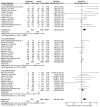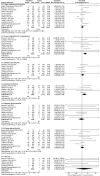Incidence and Risk of Infection Associated With Fingolimod in Patients With Multiple Sclerosis: A Systematic Review and Meta-Analysis of 8,448 Patients From 12 Randomized Controlled Trials
- PMID: 33763062
- PMCID: PMC7982402
- DOI: 10.3389/fimmu.2021.611711
Incidence and Risk of Infection Associated With Fingolimod in Patients With Multiple Sclerosis: A Systematic Review and Meta-Analysis of 8,448 Patients From 12 Randomized Controlled Trials
Abstract
Background and Aims: There is a controversy regarding whether fingolimod is associated with an increased risk of infection in patients with multiple sclerosis (MS). We performed a systematic review and meta-analysis of data from randomized controlled trials (RCTs) to determine the risk of infection in these patients. Methods: We systematically searched PubMed, EMBASE, the Cochrane Library, and clinicaltrials.gov from inception to April 8, 2020, to identify RCTs that reported the occurrence of infection in patients with MS treated with fingolimod. Relative risks (RRs) and 95% confidence intervals (95% CIs) were calculated using the random-effects model. Results: Twelve RCTs including 8,448 patients were eligible. Compared with the control (placebo and other active treatments), fingolimod significantly increased the risk of infection (RR, 1.16; 95% CI, 1.07-1.27; I2, 81%), regardless of whether the infection was a general infection (RR, 1.14; 95% CI, 1.05-1.25; I2, 78%), or a serious infection (RR, 1.49; 95% CI, 1.06-2.10; I2, 0%). Analyses of subgroups found that fingolimod significantly increased the risk of lower respiratory infection (RR, 1.48; 95% CI, 1.19-1.85; I2, 0%) and herpes virus infection (RR, 1.34; 95% CI, 1.01-1.78; I2, 9%). There appears to be no dose-dependent increase in the risk of infection associated with fingolimod (0.5 mg: RR, 1.15; 95% CI, 1.07-1.25; I2, 91%; 1.25 mg: RR, 1.11; 95% CI, 0.97-1.28; I2, 81%; Pinteraction = 0.66). Conclusions: Compared with a placebo and other active treatments, fingolimod was associated with a 16% increase in the risk of infection, especially lower respiratory infection and herpes virus infection. The risk of infection associated with fingolimod might not be dose related.
Keywords: dose-dependence; fingolimod; infection; meta-analysis; multiple sclerosis.
Copyright © 2021 Zhao, Ma, Gu, Dong, Lv and Zhong.
Conflict of interest statement
The authors declare that the research was conducted in the absence of any commercial or financial relationships that could be construed as a potential conflict of interest.
Figures




References
Publication types
MeSH terms
Substances
LinkOut - more resources
Full Text Sources
Other Literature Sources
Medical
Miscellaneous

